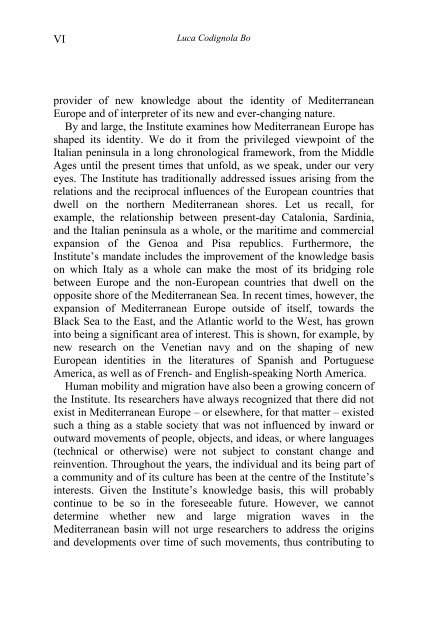Untitled - Istituto di Storia dell'Europa Mediterranea - Cnr
Untitled - Istituto di Storia dell'Europa Mediterranea - Cnr
Untitled - Istituto di Storia dell'Europa Mediterranea - Cnr
Create successful ePaper yourself
Turn your PDF publications into a flip-book with our unique Google optimized e-Paper software.
VI<br />
Luca Co<strong>di</strong>gnola Bo<br />
provider of new knowledge about the identity of Me<strong>di</strong>terranean<br />
Europe and of interpreter of its new and ever-changing nature.<br />
By and large, the Institute examines how Me<strong>di</strong>terranean Europe has<br />
shaped its identity. We do it from the privileged viewpoint of the<br />
Italian peninsula in a long chronological framework, from the Middle<br />
Ages until the present times that unfold, as we speak, under our very<br />
eyes. The Institute has tra<strong>di</strong>tionally addressed issues arising from the<br />
relations and the reciprocal influences of the European countries that<br />
dwell on the northern Me<strong>di</strong>terranean shores. Let us recall, for<br />
example, the relationship between present-day Catalonia, Sar<strong>di</strong>nia,<br />
and the Italian peninsula as a whole, or the maritime and commercial<br />
expansion of the Genoa and Pisa republics. Furthermore, the<br />
Institute’s mandate includes the improvement of the knowledge basis<br />
on which Italy as a whole can make the most of its bridging role<br />
between Europe and the non-European countries that dwell on the<br />
opposite shore of the Me<strong>di</strong>terranean Sea. In recent times, however, the<br />
expansion of Me<strong>di</strong>terranean Europe outside of itself, towards the<br />
Black Sea to the East, and the Atlantic world to the West, has grown<br />
into being a significant area of interest. This is shown, for example, by<br />
new research on the Venetian navy and on the shaping of new<br />
European identities in the literatures of Spanish and Portuguese<br />
America, as well as of French- and English-speaking North America.<br />
Human mobility and migration have also been a growing concern of<br />
the Institute. Its researchers have always recognized that there <strong>di</strong>d not<br />
exist in Me<strong>di</strong>terranean Europe – or elsewhere, for that matter – existed<br />
such a thing as a stable society that was not influenced by inward or<br />
outward movements of people, objects, and ideas, or where languages<br />
(technical or otherwise) were not subject to constant change and<br />
reinvention. Throughout the years, the in<strong>di</strong>vidual and its being part of<br />
a community and of its culture has been at the centre of the Institute’s<br />
interests. Given the Institute’s knowledge basis, this will probably<br />
continue to be so in the foreseeable future. However, we cannot<br />
determine whether new and large migration waves in the<br />
Me<strong>di</strong>terranean basin will not urge researchers to address the origins<br />
and developments over time of such movements, thus contributing to


